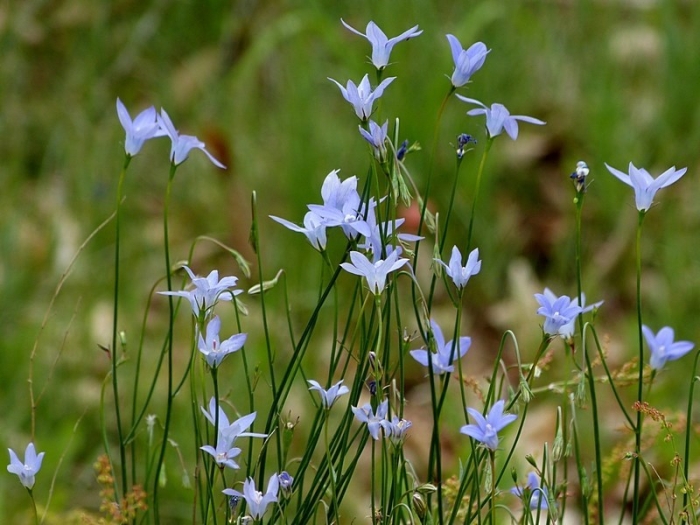Tufted Bluebell
(Wahlenbergia capillaris)
Tufted Bluebell (Wahlenbergia capillaris)
/
/

Max Campbell
CC BY 4.0
Image By:
Max Campbell
Recorded By:
Copyright:
CC BY 4.0
Copyright Notice:
Photo by: Max Campbell | License Type: CC BY 4.0 | License URL: http://creativecommons.org/licenses/by/4.0/ | Rights Holder: Max Campbell | Publisher: iNaturalist | Date Created: 2016-10-09T11:37:09Z |
























Estimated Native Range
Summary
Wahlenbergia capillaris, commonly known as Tufted Bluebell, is a perennial herb native to a variety of habitats including grasslands, open forests, and woodland clearings in Australia and New Guinea. This plant typically grows up to 20 inches high and features linear leaves. Its blue, bell-shaped flowers are arranged in cymes and are known for their delicate appearance. Flowering mainly occurs between October and March, adding a splash of color to the landscape during these months.
Tufted Bluebell is appreciated for its low maintenance and the charming blue flowers that can enhance the beauty of informal garden borders, cottage gardens, and naturalized areas. It is also suitable for container planting. This species prefers well-drained soil and can tolerate a range of soil types, from sandy to loamy. It thrives in full sun to part shade and requires moderate watering, especially during dry periods. While it is not prone to serious pest or disease problems, overwatering can lead to root rot. Tufted Bluebell can self-seed under optimal conditions, which should be monitored to prevent unwanted spread.CC BY-SA 4.0
Tufted Bluebell is appreciated for its low maintenance and the charming blue flowers that can enhance the beauty of informal garden borders, cottage gardens, and naturalized areas. It is also suitable for container planting. This species prefers well-drained soil and can tolerate a range of soil types, from sandy to loamy. It thrives in full sun to part shade and requires moderate watering, especially during dry periods. While it is not prone to serious pest or disease problems, overwatering can lead to root rot. Tufted Bluebell can self-seed under optimal conditions, which should be monitored to prevent unwanted spread.CC BY-SA 4.0
Plant Description
- Plant Type: Herb
- Height: 0.5-2 feet
- Width: 0.5-1 feet
- Growth Rate: Moderate
- Flower Color: Blue
- Flowering Season: Spring, Summer
- Leaf Retention: Evergreen
Growth Requirements
- Sun: Full Sun, Part Shade
- Water: Medium
- Drainage: Medium, Fast
Common Uses
Border Plant, Butterfly Garden, Groundcover, Low Maintenance, Rock Garden
Natural Habitat
Native to grasslands, open forests, and woodland clearings in Australia and New Guinea
Other Names
Common Names: Slender Bluebell
Scientific Names: , Wahlenbergia capillaris, Campanula capillaris, Campanula gracilis var. capillaris, Wahlenbergia communis, Wahlenbergia gracilis var. capillaris, Wahlenbergia multicaulis var. dispar,
GBIF Accepted Name: